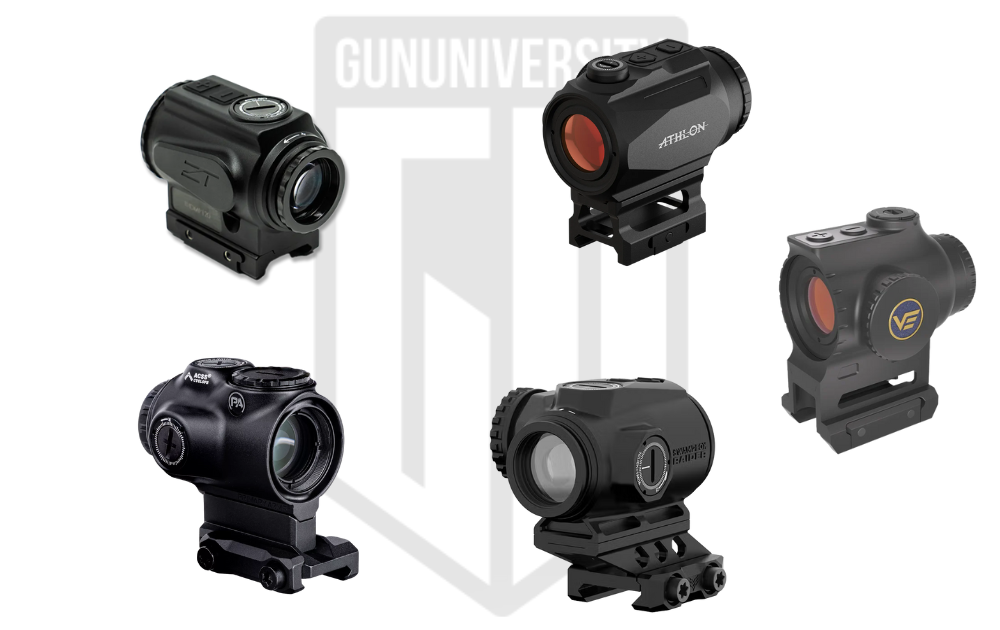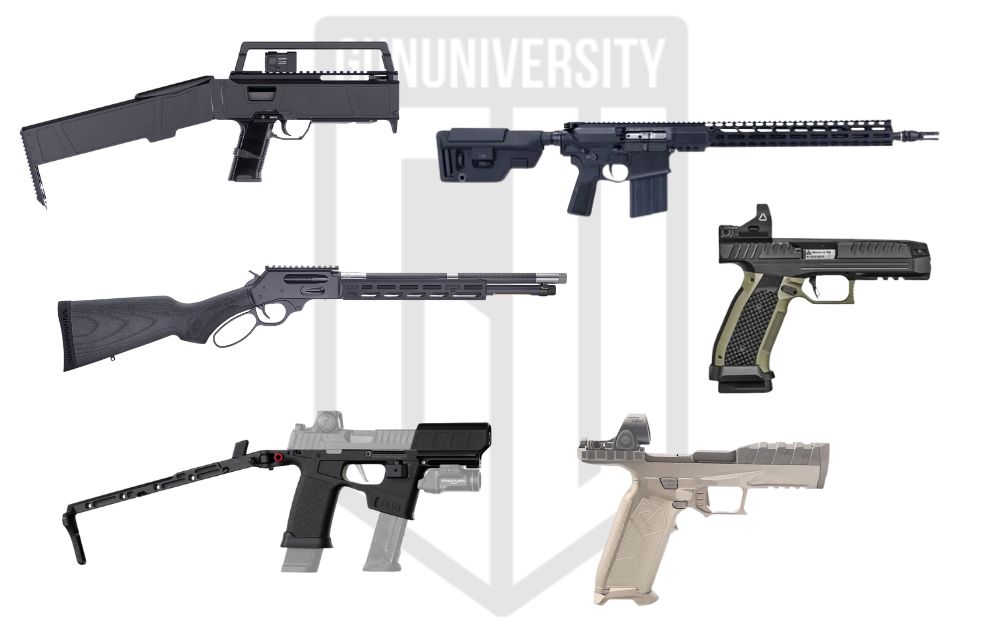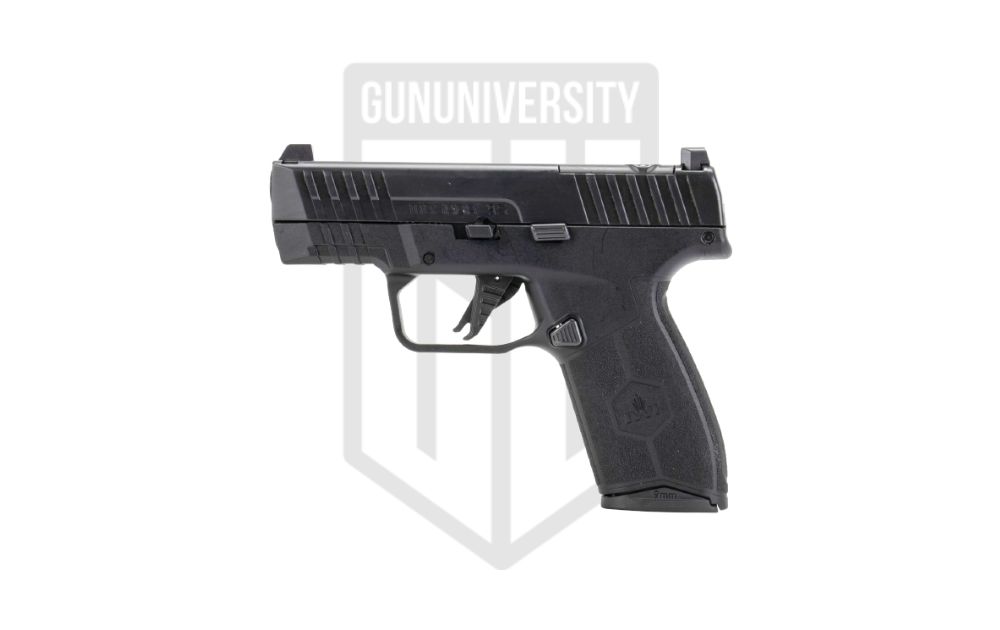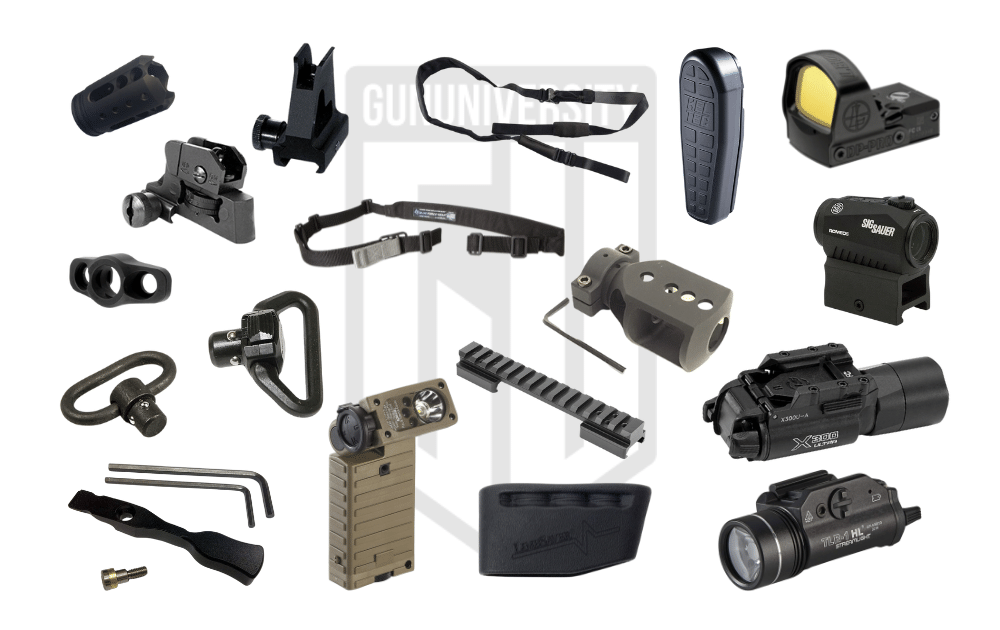How to Choose a Gun the Right Way
Choosing the right gun can be a relatively daunting task. There are just so many options for which firearm to get.
But, choosing the right gun for you doesn’t have to be difficult. By following a few simple guidelines, you can make sure that the gun you choose is right for you.
In this article, you will learn:
- The factors that determine how to choose the right gun
- Why choosing the right gun is so important
- What to look out for when buying a used handgun
So let’s get to it!
Factors to Help You Choose the Right Gun
Choosing a gun is more than choosing what looks cool. Or that is cheap–more often than not, this is a bad sign!
So, how do you know which is the best gun for you? Let’s take a look at some of these key points to consider when selecting your first firearm.
The Purpose for Your Firearm
This might seem a little silly. Don’t all guns serve the same purpose? The answer is no.
In fact, determining the purpose for the firearm is the #1 consideration for choosing the right gun for you.
We’re often (and I mean OFTEN) asked: “What gun should I get?”
We typically respond with, “I don’t know. What vehicle should I get?”
Hopefully our answering a question with a question helps to show how it is almost impossible to answer what gun you should get without knowing the purpose.
Using vehicles as an example: If I want to haul lumber, I should get a pickup truck like an F-150. However, if I want excellent gas mileage I should maybe look at a hybrid like a Prius. Note how both vehicles serve their purpose well but they are likely horrible at each other’s purpose. A Prius is bad for hauling lumber just as the F-150 is bad for a fuel-efficient vehicle.
The same is true with firearms.
If you’re looking for a firearm for hunting, a Glock 19 compact handgun would be just as bad at the job as a Remington 700 rifle would be for concealed carry/self-defense. However, the Glock 19 could be great for concealed carry while the Remington 700 could be great for hunting.
See what we mean? The purpose is key and should be the FIRST thing considered when trying to figure out what gun you should get.

(For looking like a badass while stirring your drink, this derringer is obviously the right choice.)
Point is this… Don’t go running off buying a gun without first knowing its purpose. And, if you have more than one purpose… great! There’s a chance that there might be a gun that solves both. For example, an AR-15 is great for home defense, some hunting, and target shooting/range time.
Ease of Maintenance
If you’re wondering on how to choose the right gun for you, it’s a good chance that this is your first firearm. And that’s ok. We were all first-timers at some point.
But what many don’t realize is that a gun needs routine maintenance and care. A well-cleaned and lubricated firearm is sure to fire much better than one that has been neglected.
It’s like using a knife. A dull edged blade is not as effective or as safe as a well maintained and sharpened one. But not all guns are built the same when it comes to ease of care. Some firearms come right apart and are relatively low-maintenance. But others can be a bit more difficult. So opt for a more noob-friendly experience when choosing your first gun.
For example, easy to maintain handguns are modern pistols like Glock, Sigs, and HKs. A more difficult gun to maintain is a 1911.
Getting the Right Quality
There’s an old saying that goes, “You get what you pay for.” And that definitely tends to hold true in the gun world…to a point. As an example, if you’re looking for a defensive handgun, once you pass $1,000, you’re not getting a better return on your value. Around $500 and up is a good target for a CCW gun.
And with what’s at stake every time you pull the trigger, quality is a huge factor that must be considered when choosing the right gun. You should always strive to get the best quality firearm you can. Sticking to trusted names should help you do this. These may include names such as:
- Smith and Wesson
- Glock
- Winchester Repeating Arms Company
- Sig Sauer
- Heckler and Koch
- Beretta
- Barrett Firearms Manufacturing
- Colt Defense
- Springfield Armory
- Sturm, Ruger & Co., Inc.
Size of the Grip
Getting a pocket revolver may seem like a great choice for concealed carry. And it definitely can be. But what if you have hands the size of Shaq’s? That pocket revolver may not be the best for you. Your firearm should be an extension of your person. Don’t try to force it. Same goes for those with smaller hands. Don’t go purchasing the largest size gun you find. Make sure you can comfortably and securely hold your firearm.
Smaller guns are easier to conceal. Bigger guns are easier to shoot. There’s a trade-off in this continuum.
Your Safety Selection
There are many types of safeties available for guns such as:
- Thumb Safeties
- Grip Safeties
- Trigger Safeties
It is monumentally important that you can comfortably and reliably be able to operate your gun’s safety mechanism. Each of these have their own pros and cons. Personally, I prefer only trigger safeties for CCW guns whereas a grip or thumb safety might be desirable for those newer to firearms.
Be aware of this: a safety should NEVER be relied upon for the safety of a gun. Never do something with the gun that you wouldn’t do with the safety in the off position. For example, never do something unsafe and then say “It’s ok, the safety is on.” Also, safeties work to prevent the gun from firing. This can be a great thing. However, in a defensive scenario, make sure you are VERY confident with disengaging the safety or you may be stuck not being able to shoot because the safety is on and doing what it is designed to do.
Recoil and Caliber Considerations
Generally speaking, the higher the power of your caliber of the projectile… the greater amount of recoil you will receive when firing that weapon. That being said, how much recoil can your body handle? For smaller framed individuals, a very high caliber firearm may not be the best choice. Recoil (when not properly managed) can often lead to accidental discharge or injury to the shooter. Also, higher caliber rounds tend to cost a lot more. So, if you intend on shooting a high caliber weapon, be sure that your wallet can handle the costs of ammunition.
Looking for your first general purpose handgun? That’s easy – get a 9mm.
Why it’s Important to Choose the Right Gun
Making sure you choose the right gun is crucial for a number of reasons.
Safety Purposes
This cannot be stressed enough. Guns are lethal. If you choose a gun you cannot render safe and clear, this becomes a hazard for everyone around you and within that gun’s firing capabilities. Be a responsible gun owner and only get what you can safely handle.
Comfort and Aim
Choose a gun that fits. You wouldn’t go out and buy pants that are three sizes too extreme in either direction. Don’t do the same for a firearm! Choosing a comfortable gun allows for better aim as well! Plus, if you head out to the range and realize it doesn’t fit, you’re gonna have a bad time. And if the gun sale is final, that’s a huge waste of time and money. On top of all this, choosing a gun that fits you helps to ensure safety by its ability to be properly wielded in your hands.
Use Limitations
This is definitely something that needs to be considered for home defense and hunting. In the event of home defense, a small .22 may seem like a good choice. But is it? In the hands of an expert, a .22 can be just as lethal as any other weapon. However, if you are a beginner, you may want something with a little more stopping power.
The last thing you want to do is shoot an attacker and not stop their attack. This could lead to you getting overpowered by the assailant and having your own weapon discharged against you. For hunting, make sure you choose the right caliber for what you are shooting. If hunting small vermin, a .22 rifle would be just fine. But definitely upgrade to a large caliber when hunting larger game.
Selecting the Right Used Gun
Buying a brand new gun can be expensive. This is why many people will actually buy used firearms. But that’s ok. Sometimes buying a used gun is the right choice for you.
If it’s a quality gun that has been well maintained, there shouldn’t be a problem. Now don’t ever step foot inside a gun store without doing research on it first.
The Internet is full of tips for buying a used gun. Make sure that the seller is reputable and holds all the proper licensing that is required. Once verified, head in and start your shopping experience and look for a knowledgeable salesperson. Some salespeople will sling around a bunch of snake oil. But make sure what they are saying is true and accurate. Also (especially for first time buyers) try and find a salesperson that has the patience to go through the sale process with you. Not someone trying to hit a quota and push you out the door.
A great salesperson can guide you through a great used gun sale. A bad salesperson will make a recommendation or try to steer you to one particular firearm without helping you figure out what is right for you and your purpose.
But just to be sure, here are some areas you need to inspect prior to purchasing a pre-owned gun:
The Warranty
If a used gun comes with a warranty, this is usually a good sign that you have found a reputable dealer and firearm. This warranty can include repair work or total gun replacement.
The Exterior of the Gun
This will probably be the first thing you notice upon inspecting the firearm. Check to make sure that it has been well maintained. Abrasions to the stock and frame should be minimal–beyond that of standard wear and tear. Also, check for pitting. Pitting is one of those Big Bads when it comes to guns. Avoid it at all costs.
Disassembly Joints
This might surprise you, but definitely check where the gun is disassembled for irregularities. If you see stripped or bottomed screws, that’s a sure sign that the gun was not maintained properly by someone who knew what they were doing. This can put the whole structural integrity of the gun in jeopardy.
Interior of the Gun
IMPORTANT NOTE: When inspecting the interior, you will need to disassemble the gun. Only do so with the explicit permission of the seller. Do not break down any firearm unexpectedly. This can lead to altercations you do not want to be a part of. Better yet, ask the seller to disassemble the weapon for you. Anyway… Thoroughly inspect the interior mechanisms for pitting and rust. The gun should be well-maintained, oiled, and free from pitting. If the seller will not allow the interior to be inspected or if you find pitting, that should be a no-brainer decision. Hard pass.
Here’s a quick tip I use at gun shows to check the firing pin: If the pistol is a big enough caliber (9mm or greater), I put a pencil with a fresh eraser into the pistol, eraser side down while the pistol is pointed straight up. When you dry-fire the gun, the firing pin should make the pencil jump (sometimes up and out of the gun). If the pencil doesn’t move, then a round won’t be fired.
Controls and Actions
Make sure all component move freely without any seizures or hesitations. Ensure the hammer can be easily cocked for single action firearms. Verify all latches and releases operate safely and with ease. Malfunctioning pieces can lead to poor operation or misfires. And that’s the last thing you want in an emergency situation.
Verify and Research
Let’s say you’ve found what looks to be a great gun for you but don’t know too much about it. Ask for it to be placed on hold for a day or so, and go do your research. Learn as much about the weapon as you can before making the call to purchase. Some sellers may even let you handle the weapon at a range prior to selling. This is just like taking a used car out for a test drive. Don’t be afraid to do so just be sure to use proper protection!
How to Choose the Right Gun?
By examining these factors (whether new or used), you can learn how to choose the right gun for you. Remember, owning a gun isn’t a decision to be taken lightly. Hastily rushed decisions can lead to a poor shooting and owner experience. So be sure to take your time and ensure that the gun you choose is the best one for you.
Recent Posts
January 19, 2026
January 12, 2026
January 10, 2026
January 10, 2026





The best part of your blog is when you said that you must choose a gun seller that is with proper licenses and is reputable. My uncle will find this tip helpful because he is interested in purchasing a riffle that he can use on his hunting trips every last week of the month. Your tips will help him to ensure that he will only deal with a gun seller that has all his needs.
I recently got my permit for concealed carry, so I needed to buy a handgun to use for self-defense. I appreciate you informing us that a gun requires routine maintenance since a well-cleaned and lubricated firearm always works better than one that has been neglected. I’ll be sure to take proper care of it once I find a handgun when visiting the gun shop this weekend.
I love how you mentioned comfort being a crucial aspect on improving your aim. I like to get acquainted with the sport of hunting, and it’s my first time owning a firearm. For once, I would like to feel some sort of adrenaline or rush, because I could really use that right now. With that being said, I’ll make sure to find the best gun store in the city.
It really helped when you talked about firearms and how to select the right one for you! Recently, my cousin said she’s interested in purchasing a gun. My cousin mentioned she wants to have a gun for protection, so I’ll be sure to share your guide with her! Thanks for the advice on considering a gun’s maintenance needs before buying one!
Thanks, Eli!
Thank you for explaining that you should choose a gun that you can safely handle when deciding what gun to own. My son is thinking about getting his own gun just for safety reasons along with a concealed carry license. I’ll be sure to take him to a range and see what kind of guns he feels safe using and taking care of.
Build your own gun. Build the handle to your liking. Every gun you pick up should be fit to you not someone else’s gun. You have to be the one to use it if it fits you you’ll be a better shooter. You’ll be able to handle it better. Nothing should be palomor that’s a prototype gun it’s not ment for any thing other then just to test fire with barely any gunpowder so it doesn’t blow up on you. If you like it get the frame turned to medal. You make sure your slide rails are longer. Because all glock slide rails are four tiny medal peace’s melted in to plastic, it won’t shoot real billets. It will do damage only at close rage you need a hand gun with longer slide rails and make sure you build everything to you no one else. Something you fall in love with.
Thanks for mentioning how it is important to always try to get a firearm of the best quality possible. I think that a great way to ensure the quality of a gun is to purchase it from a dealer that has a good reputation. That way, you can be sure that their past customers were satisfied with the firearm they reviewed, so you will be too.